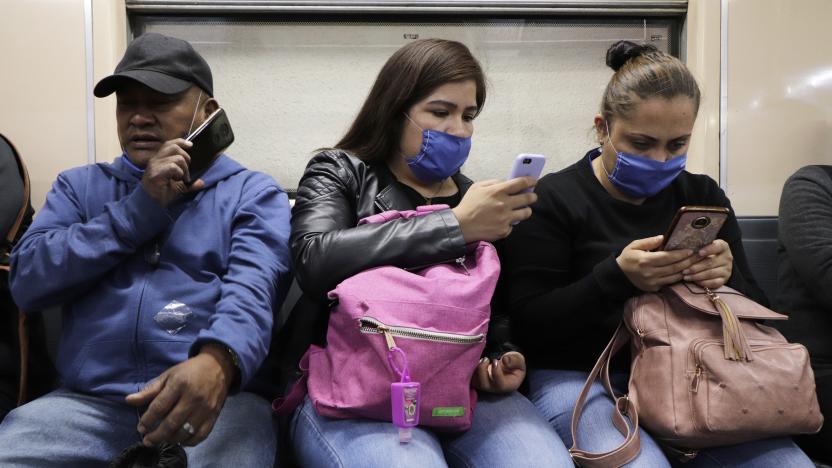tracing
Latest

WhatsApp sues Indian government over law making private messages 'traceable'
WhatsApp has sued the Indian government over a new internet law that would force it to make users' message "traceable."

Bluetooth update could turn wearables into COVID-19 trackers
Could your smartwatch join a global network of contact tracing devices?

France asks Apple to lift Bluetooth limits to further its coronavirus tracker
Apple's operating system settings are standing in the way of France's COVID-19 contact-tracing app.

Nano barcodes can trace bombs even after they've exploded
You may not pay much notice to product trackers like barcodes and RFID tags, but they're absolutely vital in some fields; they cut back on bootlegging and help police determine the origins of bombs. Worcester Polytechnic Institute may have just delivered a major breakthrough, then, by developing nanoparticle barcodes. The minuscule tracers identify an object by producing a unique thermal signature (those colored lines you see in the photo) when they reach their melting point. As they don't participate in any chemical reaction, you can integrate them into any item and get a positive ID whenever you like, even if you're dealing with exploded TNT.

Sliding Keyboard: it's like Swype, but for Windows Phone 7
In the Android realm, Swype has been life-changing for many; of course, reverting back to the messaging ways of old has been a must when jumping ship to WP7. Now, gesture tracing crosses the aisle, and it's hopping over to Microsoft's turf courtesy of Invoke IT's Sliding Keyboard. With the look of the regular ol' WP7 keyboard, this set of arm floaties records the user tracing out text, just like ex-Android fans are accustomed to. The company goes a bit further by offering a pair of goggles -- in the form of Bing search, text messaging and email options along the bottom of the app. Sure, it's seeing its fair share of first-revision bugs (word recognition seems a bit poor based on early reviews), but at a cool $1.29 (and a free trial preceding that), it's a good bit cheaper than a therapy session. Right?

GadgetTrak retrieves 95 percent of stolen laptops, puts RoboCop to shame (video)
Want your stolen gear back? Don't call some gung-ho superhero who's as likely to blow up your small grocery store as he is to catch those perps, call GadgetTrak instead. The little startup company has grown since we last heard of it back in 2007, and is now operating a $25 per year tracking service that has delivered a statistically significant 95 percent success rate on reuniting gadgets with their owners. Available for Mac OS and Windows laptops, as well as mobile phones (BlackBerrys, WinMo, and iPhone) and even removable USB storage, the software's intelligent enough to remotely activate your webcam and ping the incriminating info back directly to you -- no data is sent to GadgetTrak. Check out some recent news coverage of the software and its implementation in local schools after the break.

Internet-enabled TrailGuard metal detectors snitch on poachers
The latest anti-poaching tool may not be as completely bizarre as the Robodeer, but the TrailGuard technology coming out of Steve Gulick's laboratory is entirely more sophisticated (and stealthy, too). The system consists of a network of metal detectors buried next to forest trails which will detect the presence of a contraband machete or rifle and swing into action. Upon recognizing a potential weapon, the sensor will "send a radio signal to a nearby internet gateway and then to the internet via satellite," which will subsequently alert a ranger to the unwanted guest practically in real-time. The developing team insinuates that this product could make the rounds that rangers make a lot more efficient, and considering that most national parks are somewhat understaffed, this could help them cover the ground that they need to. So if you just so happen to wander out in the woods and pitch a tent with metal stakes, only to be approached by an armed wildlife officer, don't be too alarmed.

UK Constitution Committee to investigate surveillance overload
For those dwelling in England who enjoy a touch of privacy in their day to day lives, help could be on the way. Amidst the smattering of new surveillance methods being installed and implemented within the nation's border comes a second inquiry into the "constitutional implications" of such invasive measures. If you'll recall, the Commons' Home Affairs committee has already planned its own review, and now the UK's Constitution Committee will be "conducting an inquiry on the consequences of the collection and use of surveillance and personal data by the State." Basically, the group is trying to visualize just how damaging all these CCTV installations, car trackers, and behavior monitors are on the "relationship between individuals and institutions." Another aspect will be to scrutinize whether UK citizens need additional protection under the law from such voyeuristic tactics, and judging solely by the sheer multitude of surveying going on over there, we couldn't complain with a little extra shielding. [Warning: Word Document read link][Via El Reg]

Lodenfrey's io-Jacket utilizes GPSoverIP tracking technology
Utilizing hybrid GPS tracking technology to locate things whilst inside a building has wandered over into the commercial realm a few times before, but Germany's Lodenfrey is hoping you'll keep said technology overtly near and dear to your heart. The io-Jacket, which had one unit built to raise money for the "Humans for Humans" foundation, doesn't differ too much from other gizmo-laced jackets that have come before at first glance, but if you look beyond the built-in Bluetooth, integrated MP3 player, touch-sensitive control pads, and dashing good looks, you'll notice the compatibility with GPSoverIP. This functionality enables the wearer to upload "real-time tracking data" via their cellphone to a website, where a paranoid parent or mission commander could keep watch on the situation regardless of buildings. No word on future pricing or availability options just yet, but the one unit that was auctioned off for charity fetched €2,960 ($4,019) -- which is reportedly about €740 ($1,005) less than the cost of construction.[Via The Raw Feed]

California gang members to sport GPS trackers
Things just seem to be going downhill ever since the courts ruled that dodgy GPS tracking wasn't unlawful, and here again we're seeing Big Brother tactics being used to keep a sharp eye on ex-criminals. While no variety of console is being handed out to folks who rat out San Bernardino County gang members, officials are hoping to get several Senate Bills and an Assembly Bill passed which would divvy out "harsher punishments and monitoring standards for gang members." Essentially, ex-gang members would be required to sport GPS tracking devices so The Man can "track adult gang members currently on probation," which certainly would give them a reason to ponder whether jumping at the next temptation is really worth it. Currently, the pilot program is up and running in Apple Valley and Victorville, and so far "35 adult probationers have been fitted with GPS devices," but if you mischievous ones are counting on a lack of funding to dry this initiative up real quick like, you should probably know that Sentinel is providing the devices for the current program "at no cost."[Via TheRawFeed]

AT&T and Verizon kick kid phones to the curb
In an announcement sure to make tweens scream and parents sigh, both AT&T and Verizon Wireless have seemingly simultaneously decided to stop featuring their respective kid-centric handsets. Folks interested in Verizon's Migo will now be shown LG's 3450L flip-phone instead, as the company claims that its texting abilities and Chaperone capability will lend itself to being an effective youth-oriented option. As for AT&T, its Firefly mobile will now be sold solely online, but there was no mention of what the carrier planned on offering when paranoid parents showed up looking for a highly controllable device in-store. Of course, both of these phones should remain available in other mass market channels for those still interested, but we're sure your nine-year old kid will be lobbying for something a bit more sophisticated in a few months anyway.[Via PhoneScoop]

Xerox wants to extract demographic information from web surfers
The age of Big Brother everywhere is certainly upon us, and while we've seen (or at least heard of) tracking devices being implanted in the most unusual of places, it looks like Xerox is hoping to join the devilish fray. In an attempt to craft a demographic extractor to garner marketing dollars galore, a recently filed patent application spells out a system that utilizes software (and potentially hardware) to map users to "centroid vectors" which would determine a person's age, sex, and other "private" information simply based on their website visits. Interestingly, test cases are reportedly showing a respectable "75-percent accuracy rate" so long as a "sufficient number of pages were visited." Still, we can't imagine any tracing technology would be lawfully allowed behind the backs of law-abiding citizens (right?), but considering that even your TiVo has the potential to sell your soul to lucrative ad agencies, we wouldn't put it past 'em.[Via ArsTechnica]

Lockheed Martin eyes quantum entanglement radar
We've got quantum dot lasers, cryptographic data networks, teleportation (saywha?), and a pesky company to boot, but the (in)famous defense contractor Lockheed Martin has apparently hit the loony sauce a bit too quickly on its latest patent application. In a proposed effort to concoct the ultimate omniscient radar, the firm is suggesting that it can break the boundaries of theoretical physics and create a "quantum entanglement" scanner that can "penetrate any type of defense to identify hidden weapons and roadside bombs from hundreds of miles away." The theory -- which hasn't been realized in a product just yet -- suggests that two particles can be joined so that whatever happens to one must also happen to its partner, however far apart they are, which could be used to detect contraband from faraway locales (or peek through suspicious garb). Interestingly, it doesn't seem that we're the only ones wondering just what type of Kool-Aid the outfit's R&D department is sipping, as a physicist at Manchester University has reportedly insinuated that even in the far-reaching world of quantum physics, "the mechanics are just wrong." Seriously, isn't a Big Brother blimp enough for you guys?[Via Wired]





